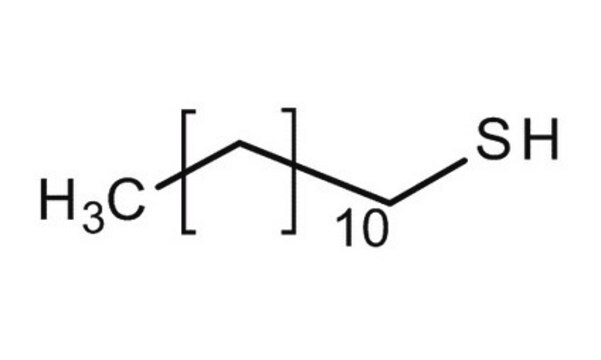234192
1-Hexanethiol
95%
Synonyme(s) :
1-Mercaptohexane, Hexyl mercaptan, MCH, Mercaptan C6
About This Item
Produits recommandés
Niveau de qualité
Essai
95%
Forme
liquid
Indice de réfraction
n20/D 1.450
pb
150-154 °C (lit.)
Pf
−81-−80 °C (lit.)
Densité
0.832 g/mL at 25 °C
Chaîne SMILES
CCCCCCS
InChI
1S/C6H14S/c1-2-3-4-5-6-7/h7H,2-6H2,1H3
Clé InChI
PMBXCGGQNSVESQ-UHFFFAOYSA-N
Vous recherchez des produits similaires ? Visite Guide de comparaison des produits
Catégories apparentées
Description générale
Application
It is used to tune the electrical characteristics in networked carbon nanotube field-effect transistors. It is also used as a monolayer on copper surfaces to retard surface oxidation during exposure to the environment which can then be desorbed effectively with an annealing step in inert N2 to provide a clean Cu surface.
Mention d'avertissement
Warning
Mentions de danger
Conseils de prudence
Classification des risques
Acute Tox. 4 Oral - Flam. Liq. 3
Code de la classe de stockage
3 - Flammable liquids
Classe de danger pour l'eau (WGK)
WGK 3
Point d'éclair (°F)
86.0 °F - closed cup
Point d'éclair (°C)
30 °C - closed cup
Équipement de protection individuelle
Eyeshields, Faceshields, Gloves, type ABEK (EN14387) respirator filter
Faites votre choix parmi les versions les plus récentes :
Certificats d'analyse (COA)
Vous ne trouvez pas la bonne version ?
Si vous avez besoin d'une version particulière, vous pouvez rechercher un certificat spécifique par le numéro de lot.
Déjà en possession de ce produit ?
Retrouvez la documentation relative aux produits que vous avez récemment achetés dans la Bibliothèque de documents.
Les clients ont également consulté
Articles
Self-assembled monolayers (SAMs) have attracted enormous interest for a wide variety of applications in micro- and nano-technology. In this article, we compare the benefits of three different classes of SAM systems (alkylthiolates on gold.
Notre équipe de scientifiques dispose d'une expérience dans tous les secteurs de la recherche, notamment en sciences de la vie, science des matériaux, synthèse chimique, chromatographie, analyse et dans de nombreux autres domaines..
Contacter notre Service technique












